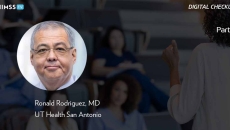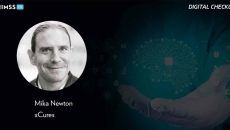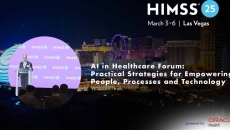clinical AI
Dr. Ronald Rodriguez, urology professor at UT Health San Antonio, says a new dual MD/MS degree in AI assures that students are not just familiar with the concepts of AI but are actually users and developers of AI at its most fundamental level.
HIMSS25
According to Anne Snowdon, chief scientific research officer at HIMSS, hospitals wishing to implement AI require sufficient IT infrastructure, strong leadership and governance frameworks, and talented staff who can use the tools safely.
HIMSS25
Jong-Soo Choi, CTO of Korea's Samsung Medical Center, says he believes AI can enhance healthcare delivery, but that technical issues related to accessing the cloud and proper handling of patient data must be overcome first.
HIMSS25
Although some patients and clinicians are hesitant to accept the use of AI in behavioral health, Dr. Colin Banas, DrFirst's chief medical officer, says AI can help customize outreach messages and educate patients about medication.
HIMSS25
The pandemic highlighted nurses' importance for care delivery, but Mary Joy Garcia-Dia, NewYork-Presbyterian Hospital's program director of nursing informatics, calls on leaders to do more to advocate for nurses and help them stay resilient.
The lack of a strong set of AI-specific regulation in the U.S. allows innovation to happen quickly, but that also requires companies to be transparent and for the industry to take responsibility for its own actions, says Mika Newton, CEO of xCures.
HIMSS25
According to Julia Zarb, Blue x Blue CEO and founder, embracing complexity, developing strong analytical skills and understanding common sensibilities and values can help newcomers succeed in the health IT field.
HIMSS25
At the HIMSS25 AI in Healthcare Forum, industry thought leaders gathered to discuss how AI will be transformative and disruptive for the future of healthcare.
HIMSS25
According to Scott Mattila, COO at Intraprise Health, healthcare leaders seeking to build a strong cybersecurity framework may want to incorporate AI-powered real-time scanning and evaluation.
HIMSS25
David Lareau, Medicomp Systems' CEO and president, says 8% to 10% of AI-captured information from complex encounters may be incorrect, but that the company's tool can flag these issues for clinicians to review.









